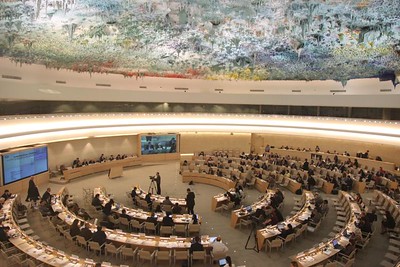Human Rights Council: the 59th Regular Session has been held from June 16 to July 9, 2025

The 59th regular session of the United Nations Human Rights Council, which opened on June 16, 2025, in Geneva, Switzerland, concluded on July 9, 2025.
Over the course of three weeks, the Council closely examined human rights issues and situations requiring its attention. It organized panel discussions on crucial topics such as the impact of climate change on human rights, access to safe drinking water and sanitation, women's rights, and obstacles to women's leadership in peace processes. In addition, it analyzed the human rights situations in specific countries, including Afghanistan, Eritrea, the Democratic Republic of the Congo, Israel and the Occupied Palestinian Territories, Sudan, Myanmar, Nicaragua, and Venezuela.
The main activities carried out during these days were as follows.
On June 16, the opening day, the Council addressed the human rights situation in Afghanistan, focusing on access to justice and protection for women and girls. It reviewed reports on the situation in Eritrea and heard an update on the fact-finding mission to the Democratic Republic of the Congo. The High Commissioner for Human Rights, Volker Türk, presented his annual report.
On June 17, attention shifted to the report of the Independent International Commission of Inquiry on Israel and the Occupied Palestinian Territories, followed by an update on the Independent International Fact-Finding Mission for Sudan.
June 18 was devoted to fundamental freedoms, with reports on freedom of opinion, expression, peaceful assembly, and association, focusing on the impact of the 2023-2025 “super election cycle.”
In the following days, the Council addressed a number of crucial issues. On June 19, the focus was on artificial intelligence, with the report of the Working Group on Human Rights in relation to Transnational Corporations, and on the right to education, with specific reports on the US and school safety. On June 20, discussions touched on the rights of LGBTQ+ persons, the issue of missing migrants and internally displaced persons, with a particular focus on Albania, Poland, Colombia, Panama, and the Marshall Islands.
On June 23, the Council addressed two main issues. First, it examined the issue of human trafficking, focusing on migrant domestic workers and analyzing reports from visits to Guinea-Bissau and Liberia. This was followed by a debate on international solidarity and the rights of indigenous peoples, enriched by reports from representatives who visited Denmark, Greenland, and Suriname.
Women's rights were the focus on June 24, with the annual discussion and panel on gender-based violence, barriers to their leadership role in peace, and gender dimensions in care systems, with focus on the Dominican Republic and Thailand.
June 25 saw reports on new forms of violence against women, with visits to the United Kingdom and the United Arab Emirates. Extreme poverty was also discussed, with a focus on Colombia, and the independence of judges and lawyers, with a look at the legal systems of indigenous peoples and Chile.
June 26 was a very rich day, with panels on the rights to water and sanitation, access to medicines and vaccines, birth registration, genocide prevention, and indigenous peoples' rights.
On June 27, attention shifted to Myanmar, with an enhanced dialogue and the intervention of the Special Rapporteur. Reports on Burundi and Venezuela were also examined.
June 30 was climate change day, with its negative impacts on human rights and a focus on Vanuatu. The Council also adopted the results of the Universal Periodic Review for 14 countries and discussed the UN Forum on Business and Human Rights.
On July 3, racism and racial discrimination were the focus, with a thematic report and the Special Rapporteur's visit to Brazil. For the Occupied Palestinian Territories, the Special Rapporteur's report was discussed. The day concluded with a debate on technical cooperation in Colombia.
On July 4, the Central African Republic was discussed, with an update from the Independent Expert, and an annual panel on national human rights institutions was planned.
Finally, from July 7 to 9, the Council adopted resolutions, decisions, and appointments of new mandate holders, thus concluding its 59th session.
The 59th session of the UN Human Rights Council addressed a wide range of critical human rights issues and situations worldwide. To stay updated on the developments and concrete results emerged from this session, you can follow the official channels of the Human Rights Council and the UN High Commissioner for Human Rights at the following link: https://www.ohchr.org/en/hr-bodies/hrc/regular-sessions/session59/regular-session

